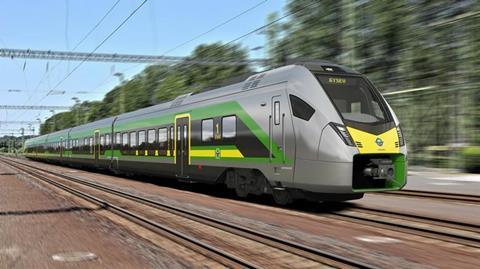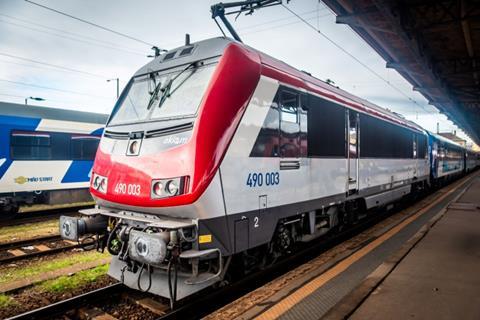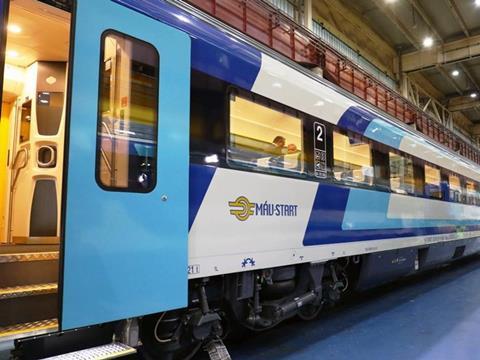
HUNGARY: Minister of Construction & Transport János Lázár announced a series of structural changes and improvements to railway services in Hungary at a press conference held in Budapest on January 8.
Lázár said that ‘in line with the Hungarian government’s conscious strategy’ to increase cross-border railway group GySEV’s role in the operation of public transport in Hungary, a further capital increase was granted to the Hungarian-Austrian operator in December, following a previous investment agreement in October. The latest move has seen the Hungarian state increase its stake in the company from 71·8% to 75%, while the Austrian government’s minority shareholding has fallen from 28·2% to 25%.
The operation of more routes in Hungary is to be transferred to GySEV later this year, leading to all of the regional passenger traffic in the northwestern provinces of Győr-Moson-Sopron, Vas, Zala changing hands, along with most of those running in Veszprém. All the affected GySEV employees will be taken on by state railway group MÁV-Volán. It was renamed after its merger with national coach company Volánbusz, which was completed at the end of the year.
GySEV rolling stock is to be used throughout the country to reinforce services now operated by national carrier MÁV-Start which has an ageing fleet. As a first step, GySEV locos are to be deployed to haul MÁV-Start’s Budapest – Békéscsaba inter-city services.
MÁV-Start vehicles currently used on the routes to be transferred to GySEV will be freed up for transfer to eastern Hungary. The nine inter-city electric multiple-units that Stadler is supplying to GySEV under a March 2024 contract are to be allocated to the Budapest – Beograd route as its upgrading nears completion; they had been initially bought for use on routes in western Hungary.
Lázár also confirmed that the Budapest – Beograd line is scheduled to reopen in January 2026 after its Chinese-backed rebuilding. He added that GySEV’s Austrian operations, where it is branded Raaberbahn, are not affected by the latest changes.
Leased locos and new coaches
In a further flurry of announcements, Lázár reported that MÁV-Volán is to receive a total of 40 electric locomotives this year under leasing agreements, and a further 15 in 2026. MÁV-Volán has been testing Alstom Astride locos owned by Akiem since October and the railway group is planning to lease 15 of them with an option for 12 more.

Under a December agreement, MÁV-Volán has taken on 15 Henschel Class ME diesel locomotives from Swedish leasing company Nordic Re-Finance; these are to arrive with MÁV-Volán later this year. These deals will see the railway group augment its pool of 24 Siemens Eurosprinter electric locos leased from Akiem under agreements signed in 2023 and 2024.
Details of the lease agreements for the latest batch of 55 locos have not yet been released. With the new arrivals, the age of the Hungarian locomotive fleet is set to fall significantly. Half of the locos would be under 40 years old, compared to only a quarter of the fleet today.
Lázár also announced that the government is to procure 285 loco-hauled coaches for inter-city services this year at a cost of HF330bn. This would be the first order for new long-distance rolling stock placed by MÁV-Start in many years.

MÁV-Volán meanwhile is aiming to complete in-house production of 50 new coaches for inter-city services and the repair of a further 50 by June as part of efforts to return stored vehicles to active service.
Improvements after criticism
Further announcements made by the minister included:
- the introduction of a national delay-repay system in which half of the ticket prices will be refunded if a service is delayed by at least 20 min;
- all the toilets at railway stations will be refurbished by the end of the year;
- cleaning services on inter-city trains will be strengthened;
- bus services will be organised to transport rail passengers who cannot board crowded trains on key summer tourism routes;
- air-conditioning will be guaranteed on certain services over the summer period;
- a MÁV+ app is being developed as an update the state railway’s existing app for roll-out in the second half of the year;
- thanks to growing ridership, rail and bus ticket revenues at the national level have not decreased since the introduction of the discounted vármegyebérlet local and országbérlet national travel passes in May 2023.
Many of these announcements are being seen as a response to criticism about the quality of railway services provided in summer 2024.

















